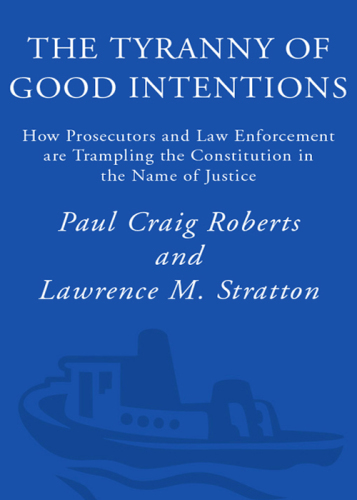
The Tyranny of Good Intentions
How Prosecutors and Law Enforcement Are Trampling the Constitution in the Name of Justice
کتاب های مرتبط
- اطلاعات
- نقد و بررسی
- دیدگاه کاربران
نقد و بررسی

May 1, 2000
According to Roberts and Stratton (both fellows at the Institute for Political Economy), our cherished individual rights are going to hell in a handbasket, delivered by politically ambitious prosecutors, misguided or malevolent bureaucrats, law enforcement agents run amok and pandering politicians. This book has odd heroes/victims: Charles Keating of the Savings and Loan scandal, Exxon Corporation (owner of the Exxon Valdez), hotelier Leona Helmsley, Michael Milken and even agri-business giant Archer Daniels Midland. The arch-villain is odder still, Jeremy Bentham, the 19th-century philosopher who popularized the theory of utilitarianism, which can be simply described as a belief in formulating public policies that result in "the greatest good for the greatest number." Bentham's villainy, the authors say, is rooted in utilitarian philosophy's role in undermining the Rights of Englishmen traceable to the Magna Carta and the Glorious Revolution of 1688 and now embodied in the Bill of Rights. Perhaps oddest of all is the characterization of J. Edgar Hoover as a paragon of morality and law enforcement restraint, qualities the authors feel are utterly lacking in today's American leadership. Roberts and Stratton will strike a nerve with this book; the government abuses they colorfully rail at--the unrestrained powers of police and prosecutors, unfair forfeiture laws, unreasonable bureaucratic regulations and police profiling, to name a few--mark a frightening departure from what most Americans consider the fair exercise of government authority. Unfortunately, in the end, the book comes off as primarily an incendiary polemic. Lost in the rhetoric of the authors' call to arms is a useful analysis of how to balance competing individual and societal interests without sacrificing fundamental rights.

























دیدگاه کاربران